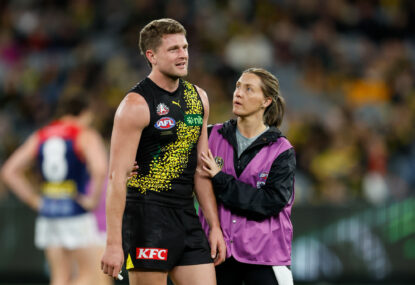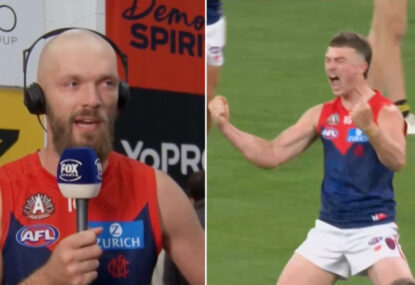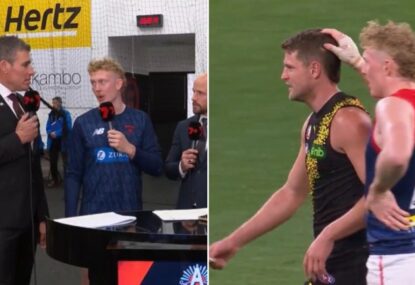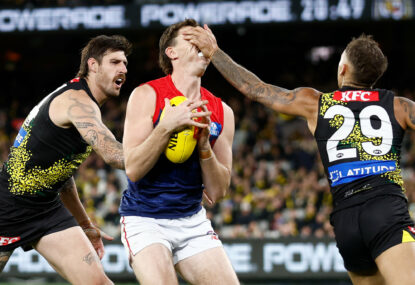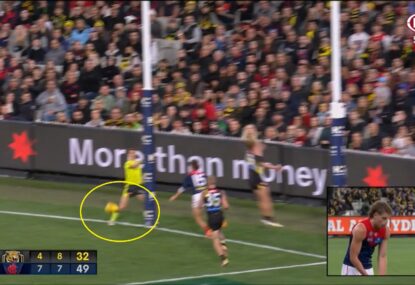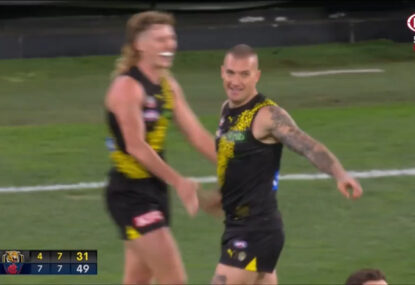Entering their 12th consecutive year without a finals appearance on the back of an embarrassing capitulation against Collingwood in the final round of the 2017 season, the pressure was mounting on the key figures of the Melbourne Football Club to return it to September action.
That pressure was multiplied after it was revealed that several members of the playing group had approached the AFL Players Association in a bid to cancel a pre-season ‘commando-style’ training camp organised by coach Simon Goodwin.
A 2-3 start to the season, including hefty losses to Hawthorn and Richmond, had Melbourne sitting in 14th position, but it was soon followed by a hot streak of matches that saw the club win their next six games by an average of 65.5 points.
A mid-season form slump wasn’t enough to put the brakes on Melbourne’s season, with the club sitting in fourth position going into Round 21. Despite strong wins over fellow finalists West Coast and Greater Western Sydney, it would be a disappointing defeat at the hands of Sydney that would cost the Demons a top-four finish.
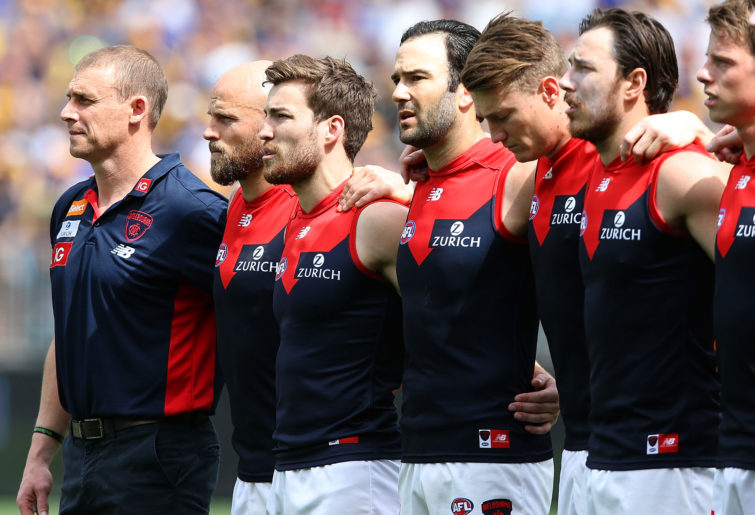
Demons head coach Simon Goodwin, lined up with his players. (Photo by Paul Kane/Getty Images)
Having qualified for the finals for the first time since 2006, there were some doubts over whether the club would stand up and perform having been away from the big stage for so long. A commanding first quarter against Geelong in their elimination final put to bed any September nerves, with the Dees cruising to a 29-point victory, setting up a semi final showdown against Hawthorn.
A professional performance saw Melbourne send the Hawks out in straight sets, advancing to their first preliminary final since 2000. Matched up against West Coast in Perth, the Demons conceded ten goals to nothing in the first half in a poor display, losing by 66 points to the eventual premiers.
Ruckman Max Gawn capped off a brilliant season by winning the Melbourne best and fairest award, beating 2017 winner Clayton Oliver and improved midfielder James Harmes, who rounded out the top three.
The Demons had a number of players leave the club in 2018, with former Docker Harley Balic deciding to retire, having lost the passion for the sport. After a 229-game career, 100 of them with Melbourne, Bernie Vince hung up the boots, with experienced duo Cam Pedersen and Tom Bugg both delisted. Also axed were Dion Johnstone, Mitch King, Pat McKenna and Lachlan Filipovic.
What started as a quiet player swap period soon turned busy for Melbourne, with the club offloading small forward Dean Kent to St Kilda for pick 65, before trading Dom Tyson to the Kangaroos in exchange for Braydon Preuss and selection 62.
Then, despite having a year remaining on his contract, Jesse Hogan was traded back home to Perth in a blockbuster deal with Fremantle, with Melbourne also giving up pick 65, receiving back selections six and 23.
That pick six was then offloaded to the Gold Coast Suns, allowing the Demons to acquire Suns’ duo Steven May and Kade Kolodjashnij. In another trade with the Saints, Melbourne received selections 36 and 46, sending pick 28 back.
With their first pick in the national draft coming at 27, Melbourne picked up Tom Sparrow from South Adelaide, before looking locally at pick 33 as they selected James Jordon. The Dees went back to South Australia at selection 53, drafting Aaron Nietschke from Central Districts, with mature-age VFL Magpie Marty Hore also becoming a Demon.
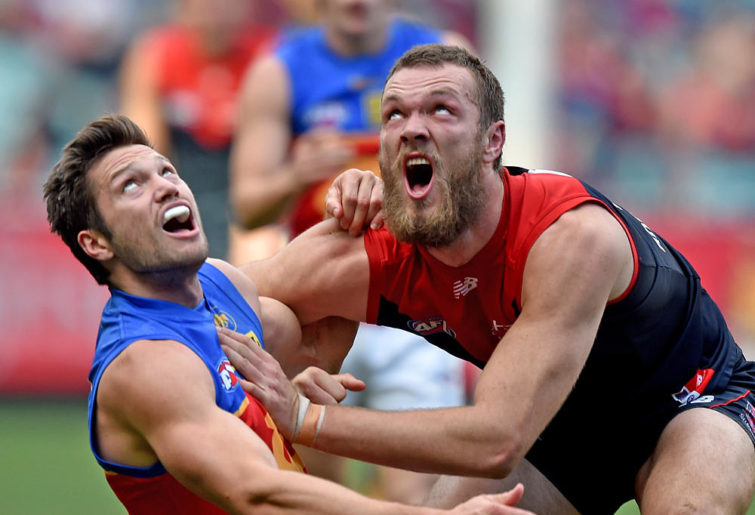
Melbourne could be 2018 premiership contenders. (AAP Image/Joe Castro)
With Melbourne’s final selection, Next Generation Academy prospect Toby Bedford joined the club, with rookie Corey Maynard joining the senior list. Their only rookie selection came in the form of Kade Chandler from Norwood.
Former Melbourne Tigers basketballer Austin Bradke and ex-Melbourne Renegade cricketer Guy Walker were also picked up as category B rookies.
In a new rule introduced by the AFL, Melbourne were eligible to sign a previously-listed AFL player straight to their rookie list, provided the player wasn’t on a list for the 2018 season. Former North Melbourne midfielder Corey Wagner, brother of Melbourne defender Josh, was signed via this method.
Playing list
New players in bold
| 1. Steven May |
16. Kade Kolodjashnij |
31. Bayley Fritsch |
| 2. Nathan Jones |
17. Sam Frost |
32. Tom Sparrow |
| 3. Christian Salem |
18. Jake Melksham |
33. Oskar Baker |
| 4. James Harmes |
19. Mitch Hannon |
34. Marty Hore |
| 5. Christian Petracca |
20. Corey Maynard |
35. Harrison Petty |
| 6. Jordan Lewis |
21. Braydon Preuss |
36. Jeff Garlett |
| 7. Jack Viney |
22. Aaron vandenBerg |
37. Kade Chandler (R) |
| 8. Jake Lever |
23. James Jordon |
38. Tim Smith (R) |
| 9. Charlie Spargo |
24. Jay Kennedy-Harris |
39. Neville Jetta |
| 10. Angus Brayshaw |
25. Tom McDonald |
40. Corey Wagner (R) |
| 11. Max Gawn |
26. Sam Weideman |
42. Josh Wagner |
| 12. Toby Bedford |
27. Aaron Nietschke |
43. Guy Walker (R) |
| 13. Clayton Oliver |
28. Oscar McDonald |
44. Joel Smith |
| 14. Michael Hibberd |
29. Jayden Hunt |
45. Declan Keilty (R) |
| 15. Billy Stretch |
30. Alex Neal-Bullen |
46. Austin Bradke (R) |
Best 22
B: Neville Jetta, Steven May, Jake Lever
HB: Michael Hibberd, Oscar McDonald, Christian Salem
C: Nathan Jones, Clayton Oliver, Angus Brayshaw
HF: Alex Neal-Bullen, Sam Weideman, Christian Petracca
F: Charlie Spargo, Tom McDonald, Jake Melksham
FOL: Max Gawn, Jack Viney, James Harmes
I/C: Kade Kolodjashnij, Jordan Lewis, Mitch Hannan, Bayley Fritsch
EMG: Jayden Hunt, Braydon Preuss, Sam Frost, Aaron vandenBerg
The star
Coming off an injury-interrupted year, Max Gawn set himself a mission to reclaim the mantle as the AFL’s premier big man. What followed was one of the most dominant seasons by a ruckman ever seen, with the 208cm giant playing every game, averaging career-highs in disposals (15.8), marks (4.5) and hitouts (44.8).
Gawn’s physical presence on the field also increased exponentially, with the 27-year-old regularly pushing back to defence to cut off opposition attacks, especially after the loss of defender Jake Lever to a knee injury.
Gawn’s dominant campaign was rewarded with his second All Australian selection, while he took out the AFL Coaches Association award. Due to reach his 100th game in the opening round of this year, Gawn is a genuine chance to buck the trend of midfielders winning the Brownlow Medal.
Needs a big year
Having enjoyed a career-best year in 2017, many expected Michael Hibberd to continue being one of Melbourne’s best ball-winners out of the back half. However, the former Bomber’s disposal average dropped from 27.4 to just 18.9, while his rebounds from defensive 50 numbers reduced significantly.
With the inclusion of Steven May into the backline and Lever still to return from injury, Hibberd will be hoping for a more settled campaign in 2019.
Ready to break out
Melbourne supporters got a glimpse of a forward line without Jesse Hogan late last season once his year ended due to a foot injury in Round 21. This paved the way for youngster Sam Weideman to take his place, with the 20-year-old starring in a career-best performance in the elimination final against Geelong.
In a landmark victory, Weideman amassed 24 possessions, took seven marks and booted three goals, highlighting his outstanding potential. With Tom McDonald set to be the main man in attack, watch for Weideman to grow as the second key tall on the back of the confidence he gained during the finals series.
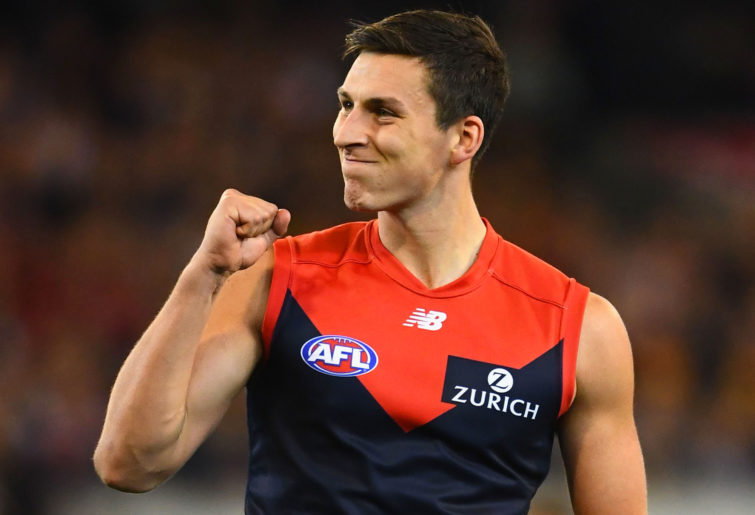
Sam Weideman of the Demons. (Photo by Quinn Rooney/Getty Images)
Last chance
With one of the most potent forward lines in the league, Melbourne boast a very impressive batch of small-to-medium attacking options. As a result, this has left veteran small Jeff Garlett on the outer.
Just one year after taking out Melbourne’s goalkicking award with 42 majors, Garlett managed just 11 senior appearances in 2018, booting 18 goals but averaging only 2.9 tackles per game. With just one more season remaining on his contract, Garlett will need to fight his way back into the seniors if he is to continue his career into his 30s.
Also facing a make-or-break year is small midfielder Jay Kennedy-Harris. The 23-year-old seemed destined for the scrapheap before he managed to earn a one year contract extension with six strong performances late in the season.
Kennedy-Harris didn’t feature in Melbourne’s September campaign, and if he is to survive on the list beyond 2019, he will have to show that he is more than just a depth option.
New colours
While no one was surprised when Gold Coast co-captain Tom Lynch signed a mega deal with Richmond as a free agent, some eyebrows were raised when fellow joint skipper Steven May also raised his hand looking for a new club.
On the final day of trading, May and teammate Kade Kolodjashnij were both packaged in a deal and sent to the Demons, with Gold Coast receiving back pick six. May’s arrival after 123 games with the Suns is a major coup for Simon Goodwin, with the 27-year-old one of the best key defenders in the league.
He will slot straight into a backline that struggled at times in 2018, conceding the most amount of points of any top eight side across the league.
Kolodjashnij is no set of steak knives either. Originally a top-five draft selection, the 78-game defender has managed just 19 senior appearances in the past two seasons due to persistent concussion and neck complaints.
At his best, the 23-year-old is a great distributor of the ball and, at 190cm, is capable of playing on both talls and smalls. There are countless stories throughout the history of the AFL of players needing a change of scenery to unlock their full potential, and Kolodjashnij could well-be the next such player.
Growing increasingly frustrated at the lack of game time he received playing as back-up to Todd Goldstein, Kangaroo Braydon Preuss put his hand up for a trade away from the club despite having two more seasons remaining on his contract.
Many people questioned why Preuss sought a trade to the Demons, who have one of, if not the best ruckman in the competition, however Max Gawn has thrown his support behind the idea of the two playing in tandem. Whether the match committee can find out a way for two giants to fit in the same 22 is a massive burning question.
The kid
With co-captain Nathan Jones entering his 14th season, the Demons picked up what could be their long-term ‘Chunk’ replacement at selection 27, with Tom Sparrow a ready-made midfielder. Drafted from South Adelaide, the 182cm Sparrow has a rare mix of speed, endurance and power, while he also enjoys getting forward to make an impact on the scoreboard.
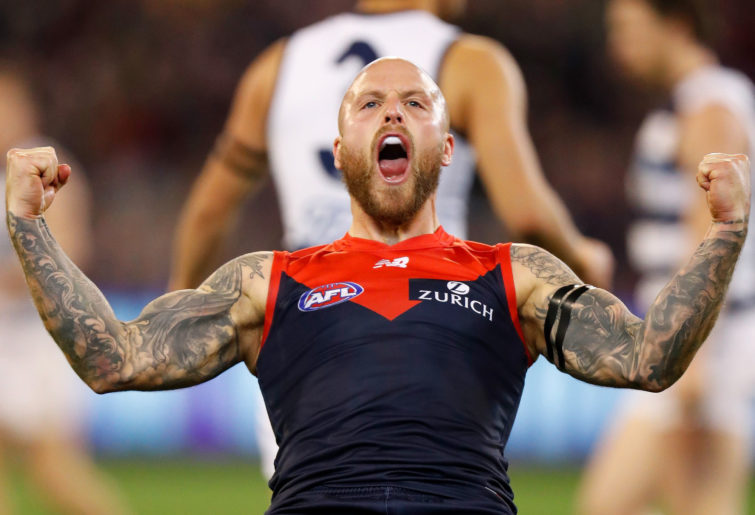
Nathan Jones of the Demons celebrates a goal (Photo by Michael Willson/AFL Media/Getty Images)
Also watch for Oskar Baker to break through for a debut in 2019. The speedy red-head came close on numerous occasions last year after a promising season in the VFL. The Queenslander has improved at a rapid rate and it wouldn’t surprise to see him become an instant hit with Melbourne fans once he earns senior selection.
Supercoach star
They don’t come much bigger than Max Gawn, both literally and figuratively, in the world of fantasy football. The big man averaged a monster 127.5 points per game in 2018, ranking him third in the league behind Brodie Grundy and Tom Mitchell.
If you’re looking for a midfield option from the Dees, look no further than Clayton Oliver, who finished sixth for average points at 114.7.
Fixture
Round 1: Port Adelaide (MCG)
Round 2: Geelong (GMHBA)
Round 3: Essendon (MCG)
Round 4: Sydney (SCG)
Round 5: St Kilda (MCG)
Round 6: Richmond (MCG)
Round 7: Hawthorn (MCG)
Round 8: Gold Coast (MS)
Round 9: West Coast (OS)
Round 10: GWS Giants (MCG)
Round 11: Adelaide (TIO)
Round 12: Collingwood (MCG)
Round 13: Bye
Round 14: Fremantle (MCG)
Round 15: Brisbane Lions (G)
Round 16: Carlton (MCG)
Round 17: Western Bulldogs (MRVL)
Round 18: West Coast (TIO TR)
Round 19: St Kilda (MRVL)
Round 20: Richmond (MCG)
Round 21: Collingwood (MCG)
Round 22: Sydney (MCG)
Round 23: North Melbourne (BA)
The Demons have been handed one of the toughest fixtures of any club in 2019, set to take on premiers West Coast twice as well as fellow top four sides Richmond and Collingwood. Two encounters with Sydney will prove challenging, while doubling-up against St Kilda, a side that managed to score an upset victory over Melbourne last year, will have their fans worrying.
As they have done every year since 2014, the Demons will play two home matches in the Northern Territory, one game each in Darwin and Alice Springs. Melbourne’s nine other home games all take place at the MCG, with a further three to be played as the away side, as well as two at Marvel Stadium. The Demons will bypass South Australia in 2019, instead making two trips to Queensland, with one match each in Perth, Sydney, Geelong and Hobart.
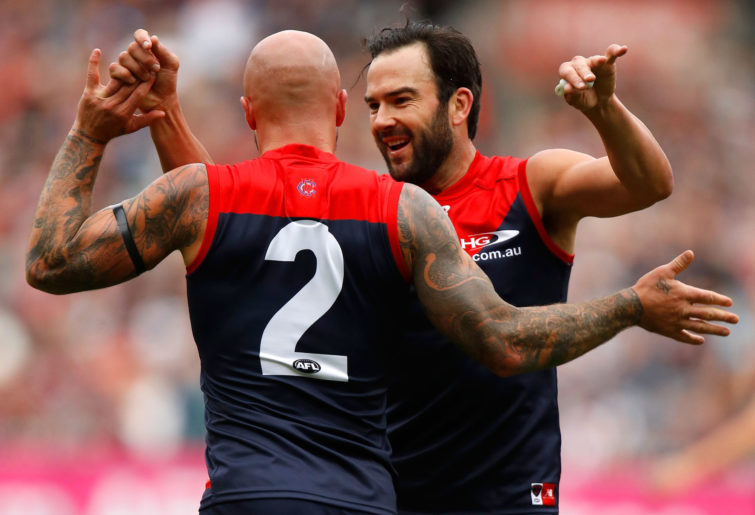
The Demons (Photo by Michael Willson/AFL Media/Getty Images)
Commercially, Melbourne have a kind fixture, with one Thursday night match and three Friday night blockbusters. As usual, the Demons will take on Collingwood in the Queen’s Birthday match, while the Anzac Day Eve match-up with Richmond, scheduled for a Wednesday night in 2019, has quickly become one of the most anticipated games on the footballing calendar. Unfortunately, both games see Melbourne as the away outfit.
The quirk
For just the second time since 2005, Melbourne will play host to Essendon in Round 3 at the MCG, breaking a run of eight consecutive games of the Bombers being the home outfit against the Demons. Melbourne’s Round 18 clash with West Coast at TIO Traeger Park will also be the first time ever that the two clubs have played in Alice Springs.
Don’t miss it
While the Demons won’t have hosting duties for their special fixtures against Richmond and Collingwood in 2019, they do get consecutive home return encounters against the two outfits late in the season.
The Round 20 fixture against the Tigers on a Saturday night will no doubt draw a big crowd, while the following week the Demons take on the Magpies in the traditional Saturday afternoon timeslot at the MCG. Six days later, the Dees will return to the ‘G to play the Sydney Swans in a bumper Friday night match. If, as expected, Melbourne are to be one of this year’s premiership contenders, these three matches across a 14 day period will have excitement at fever pitch.
Make other plans
Nothing should worry Melbourne fans too much when it comes to this year’s fixture, however a final round match-up with North Melbourne could cause some nerves.
2018 saw the Demons finally end a 17-game drought against the Kangaroos, but coming up against the side that so often had their measure in previous years is sure to bring about some mental demons, pardon the pun. With the game to be played at Blundstone Arena in Hobart, a venue Melbourne are yet to win at from two attempts, they will be desperate to avoid a pre-finals slip-up.
Final word
There is no doubt about Melbourne’s premiership credentials in season 2019. On paper, they possess arguably the most potent outfit, especially with Steven May to solidify their backline.
A knock on Melbourne’s flag chances in previous seasons has been their lack of exposure to September football, but coming off a preliminary final appearance from fifth position will have Simon Goodwin’s charges confident of standing up on the big stage.
1964 was the last time a grand old flag flew over the City of Melbourne, and the Demons are extremely well-placed to break the longest current premiership drought in the AFL.
Predicted finish: first – fourth.


































































































